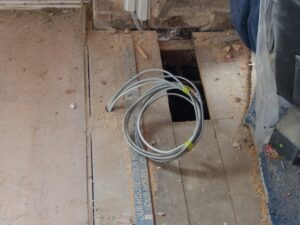If you’re looking for a way to improve the quality of your tap water, an under-sink water filter might be the solution you need. These filters are installed directly under your kitchen sink and can remove a variety of contaminants from your water, providing you with cleaner and better-tasting drinking water. With so many options available on the market, it can be difficult to determine which one is the best for you.
At Excel Mechanical, we understand how important it is to have access to clean and filtered water in your home or business. That’s why we offer high-quality under-sink water filters that are designed to meet your individual needs and budget. Our team of professionals strives to provide exceptional quality and great value, ensuring that you get the best possible system for your specific requirements.
When it comes to choosing the best under-sink water filter, there are several factors to consider, including the type of contaminants you want to remove, the filter’s lifespan, and the flow rate.
Understanding Under-Sink Water Filters
When it comes to choosing the best under-sink water filter, it’s essential to understand the different types of filters available and how they work. In this section, we will discuss the types of filters, how filtration works, and the benefits of filtered water.
Types of Filters
There are several types of filters available for under-sink water filtration systems. The most common types of filters include reverse osmosis, carbon block filters, sediment filters, and activated carbon filters.
- Reverse Osmosis: This type of filter uses a semipermeable membrane to remove impurities from water. It’s effective at removing contaminants like lead, arsenic, and fluoride.
- Carbon Block Filters: These filters use activated carbon to trap impurities and improve the overall taste and odor of water. They’re effective at removing chlorine, pesticides, and volatile organic compounds (VOCs).
- Sediment Filters: These filters are designed to remove larger particles like sand, dirt, and rust from water. They’re often used in conjunction with other types of filters.
- Activated Carbon Filters: These filters use activated carbon to remove impurities from water. They’re effective at removing chlorine, pesticides, and other chemicals.
How Filtration Works
Under-sink water filters work by using a combination of physical and chemical processes to remove impurities from water. The exact process will depend on the type of filter used, but most filters use a combination of sediment filtration, activated carbon filtration, and reverse osmosis.
Sediment filters are typically the first line of defense, removing larger particles like sand and dirt from the water. Activated carbon filters then remove chemicals like chlorine and VOCs, improving the overall taste and odor of the water. Finally, reverse osmosis filters use a semipermeable membrane to remove impurities like lead, arsenic, and fluoride from the water.
Benefits of Filtered Water
There are several benefits to using an under-sink water filter. Filtered water is:
- Safer: By removing impurities like lead and arsenic, filtered water is safer to drink and can help protect your health.
- Better Tasting: By removing chemicals like chlorine and improving the overall taste and odor of the water, filtered water tastes better.
- More Convenient: With an under-sink water filter, you can have access to clean, filtered water right from your tap, eliminating the need for bottled water.
Key Features to Consider
When choosing the best under sink water filter for your home or office, there are several key features you should consider. These features include filtration capacity and flow rate, filter lifespan and maintenance, and installation requirements.
Filtration Capacity and Flow Rate
The filtration capacity and flow rate of an under sink water filter are important factors to consider. The filtration capacity refers to the amount of water the filter can purify before it needs to be replaced. The flow rate refers to the speed at which the filter can purify water.
Filter Lifespan and Maintenance
The filter lifespan and maintenance of an under sink water filter are also important factors to consider. The filter lifespan refers to how long the filter can last before it needs to be replaced. Maintenance refers to how often the filter needs to be cleaned and maintained.
Installation Requirements
The installation requirements of an under sink water filter are also important to consider. You should choose a filter that is easy to install and does not require any special tools or equipment.
Contact our reliable team for your installation needs.
Selecting the Right Filter for Your Home
When selecting an under-sink water filter, there are several factors to consider to ensure that you choose the best option for your home. In this section, we will discuss the most important factors to consider when selecting an under-sink water filter, including Contaminant Reduction, Size and Space Considerations, and Cost and Value.
Contaminant Reduction
One of the most important factors to consider when selecting an under-sink water filter is the level of contaminants that the filter can remove. Different filters are designed to remove different types of contaminants, including lead, chlorine, and other harmful substances. When selecting a filter, it is important to choose one that can effectively remove the contaminants that are most prevalent in your water supply.
Size and Space Considerations
Another important factor to consider when selecting an under-sink water filter is the size and space requirements of the filter. Under-sink water filters come in a range of sizes, and it is important to choose one that will fit comfortably under your sink without taking up too much space. It is also important to consider the amount of water that the filter can process, as well as the flow rate of the filter.
Cost and Value
Cost and value are also important factors to consider when selecting an under-sink water filter. Under-sink water filters can range in price from $100 to $650, depending on the type of filter, the number of filter stages, and the features that are included. It is important to choose a filter that provides good value for your money, and that will provide you with clean, safe drinking water for years to come.
Installation and Maintenance
When it comes to installing an under sink water filter, you have two options: DIY installation or professional installation. If you have basic plumbing knowledge, you may be able to install the filter yourself. However, if you’re not comfortable working with plumbing, it’s best to hire a professional plumber for the job.
DIY Installation Tips
If you choose to install the filter yourself, follow these tips for a successful installation:
- Read the installation instructions carefully before beginning.
- Turn off the water supply to the sink before starting the installation process.
- Make sure you have all the necessary tools and materials on hand before you begin.
- Follow the manufacturer’s instructions carefully, step by step.
- Test the system thoroughly before using it to ensure it’s working properly.
Professional Installation
If you’re not comfortable with DIY installation or don’t have the necessary tools, it’s best to hire a professional plumber to install your under sink water filter. A professional plumber like us has the knowledge and experience to ensure that your filter is installed correctly and that it’s working properly.
Routine Maintenance
To keep your under sink water filter working properly, it’s important to perform routine maintenance. This includes:
- Regular filter changes: Depending on the type of filter you have, you may need to change it every 6-12 months. Follow the manufacturer’s instructions for filter changes.
- Checking for leaks: Regularly check for leaks around the filter and under the sink. If you notice any leaks, contact a professional plumber to fix the issue.
- Shut-off valve: Know the location of the shut-off valve for your water filter in case you need to turn off the water supply quickly.
Top Rated Under-Sink Water Filters
When it comes to selecting the best under-sink water filter for your home or office, there are several factors to consider. These include the type of filter, the contaminants it can remove, the filter’s lifespan, and the cost.
Reverse Osmosis Systems
Reverse osmosis (RO) systems are one of the most popular types of under-sink water filters. These systems use a semi-permeable membrane to remove impurities and contaminants from the water. RO systems are highly effective at removing a wide range of contaminants, including lead, arsenic, fluoride, and chlorine.
One of the best reverse osmosis systems on the market is the Aquasana AQ-RO-3 OptimH2O. This system is NSF-certified to remove up to 99% of contaminants, including lead, chlorine, and arsenic. It also features a long-lasting filter that can provide up to six months of clean water.
Activated Carbon Filters
Activated carbon filters are another popular option for under-sink water filtration. These filters use activated carbon to remove impurities and contaminants from the water. Activated carbon filters are effective at removing chlorine, volatile organic compounds (VOCs), and unpleasant odors and tastes from the water.
One of the best activated carbon filters on the market is the Waterdrop G2 RO system. This system features a five-stage filtration process that includes activated carbon, as well as a reverse osmosis membrane. The system is NSF-certified to remove up to 99% of contaminants, and it also features a long-lasting filter that can provide up to 12 months of clean water.
Specialized Contaminant Filters
For those with specific water quality concerns, specialized contaminant filters may be the best option. These filters are designed to remove specific contaminants, such as fluoride, nitrates, or bacteria.
One of the best specialized contaminant filters on the market is the APEC Water Systems ROES-50. This system is NSF-certified to remove up to 99% of contaminants, including fluoride and arsenic. It also features a long-lasting filter that can provide up to six months of clean water.
When it comes to selecting the best under-sink water filter for your needs, it’s important to choose a system that is NSF-certified and has a long-lasting filter. Contact us to line up your next steps!




